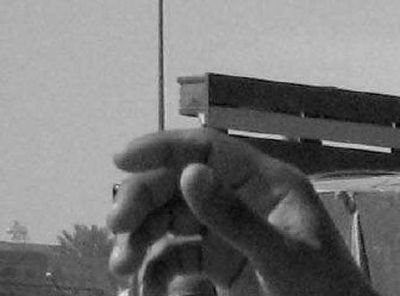Six American soldiers killed by bomb in Iraq

Six U.S. soldiers died in an explosion north of Baghdad, the military said today.
The soldiers, assigned to Task Force Lightning, were conducting combat operations in Salahuddin province when a bomb exploded Monday near their vehicles, the military said in a statement.
Three other soldiers were wounded and transported to an American military hospital for treatment, it said.
Names were withheld pending family notification.
Also Monday, a suicide car bomber turned a venerable book market into a deadly inferno and gunmen targeted Shiite pilgrims as suspected Sunni insurgents brought major bloodshed back into the lap of their main Shiite rivals. At least 38 people died in the blast, and seven pilgrims were killed.
The day’s violence – after a relative three-day lull in Baghdad – was seen as another salvo in the Sunni extremist campaign to provoke a sectarian civil war that could tear apart the Shiite-led government and erase Washington’s plans for Iraq.
The Shiite Mahdi Army militia has so far resisted full-scale retaliation through a combination of self-interest and intense government pressure. But the militia’s leader, the radical cleric Muqtada al-Sadr, is now being cornered in new ways that have put him on the defensive.
An expected Cabinet shuffle could take a serious bite out of al-Sadr’s voice in government – a move strongly encouraged by Washington.
Al-Sadr also opened the door for U.S. and Iraqi troops to enter the Mahdi stronghold of Sadr City in Baghdad – under a painstaking deal with authorities – but his loyalists are still being hunted outside the capital.
“Al-Sadr and his forces could be feeling under siege,” said Alireza Nourizadeh, chief researcher at the London-based Center for Arab-Iranian Studies. “That makes them less predictable. That means they are more dangerous.”
One possible sign of brewing troubles was 30 bullet-ridden bodies found across Baghdad. Many of those killings are blamed on Shiite death squads, and Monday’s figure was the highest in weeks.
And the Sunni extremists keep pressing.
The suicide mission tore through booksellers and other stores on narrow Mutanabi Street, a mostly Shiite-run commercial area in Baghdad’s historical heart along the Tigris River.
Within seconds, flames engulfed open-air stalls and shops brimming with books and magazines. Gas-powered generators – needed because of frequent power cuts – exploded one by one.
Firefighters had to spray huge arches of water from blocks away because their trucks were too large for the warren of lanes in old Baghdad. At least 38 people died and 105 were injured, said Raad Jabar, a Health Ministry official.
Also, gunmen opened fire on Shiite pilgrims in several places around Baghdad, killing at least seven people, police said.
The Shiites were apparently heading to shrines and holy sites in southern Iraq for the annual commemoration to end a 40-day mourning period for the death of a revered seventh-century Shiite martyr, Imam Hussein.
It was the bloodiest day in the capital in more than a week, and came on the heels of a major push by nearly 1,200 U.S. and Iraqi troops into teeming Sadr City as part of a nearly three-week-old security offensive across Baghdad.
In Sadr City, Iraqi troops set up checkpoints and took a far more visible role than Americans, who led the push into the area Sunday. The move was an apparent attempt to avoid Shiite anger in a place of past street battles with U.S. forces.
The troops plan to establish outposts in Sadr City that will bring together Iraqi police, military and U.S.-led forces, said U.S. Brig. Gen. Terry Wolff, who oversees training of Iraqi soldiers.
“It’s about presence,” he said.